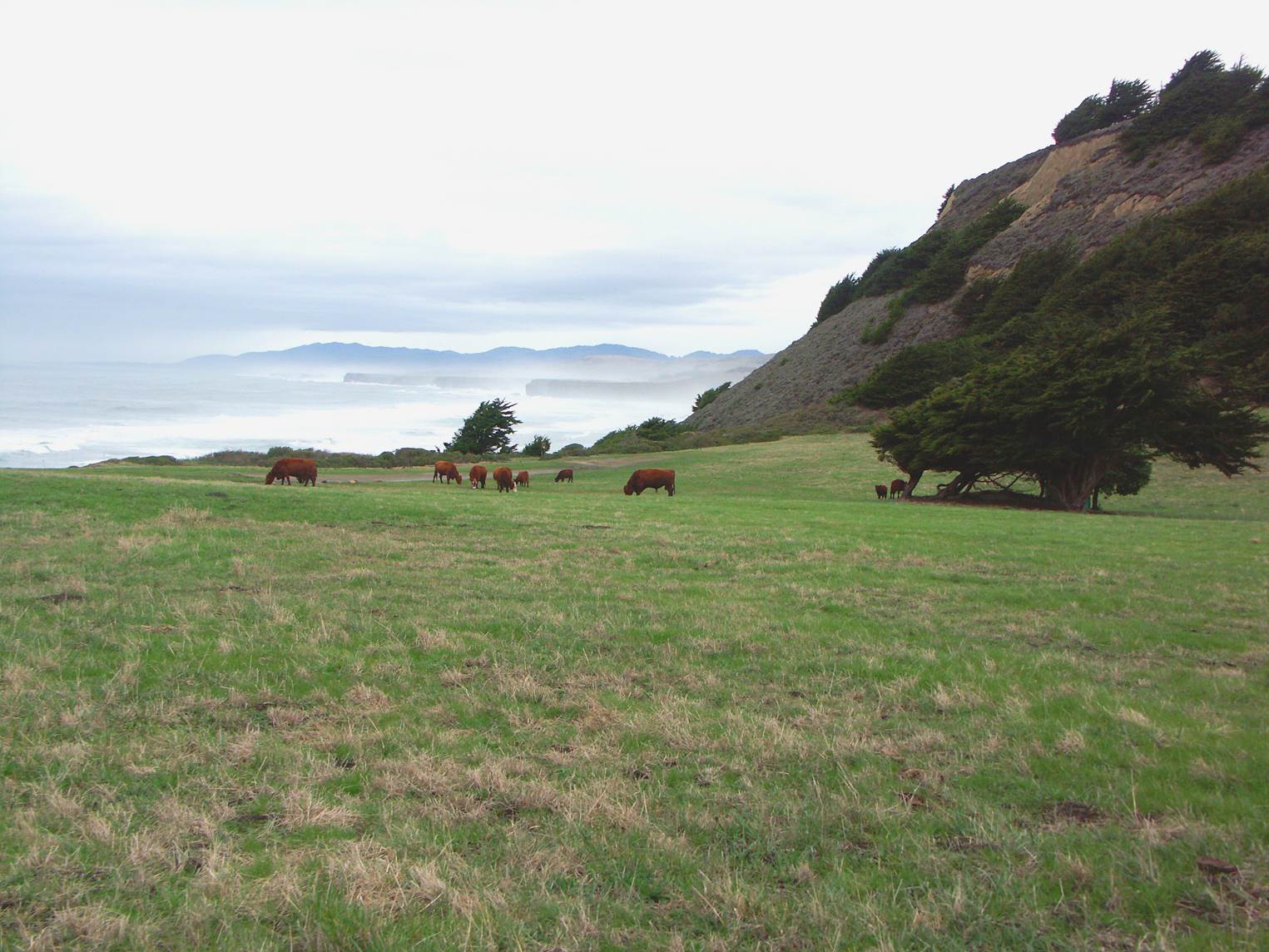Carbon Farming
Carbon farming takes carbon from the atmosphere where it’s a harmful greenhouse gas and puts it into plants and soil where it’s helpful. Farmers act as climate heroes by reviving centuries-old techniques to improve soil health, reduce erosion, save water, and enhance wildlife habitat while increasing the productivity and resilience of their lands. For over 80 years, the RCD has worked with local producers to provide the comprehensive, on-the-ground support that they need. Together, we are reversing climate change while nourishing the lands and people of San Mateo and beyond.
How does it work?
Although agriculture has been singled out as a significant greenhouse gas contributor, the good news is that its climate impacts depend largely on how it is done.
Through photosynthesis, plants remove carbon from the air and store it in their leaves, stems, and roots, which then help enrich the soil. As plants die and decompose, this carbon can either stay in the soil or be released back into the atmosphere. Carbon farming applies centuries-old agricultural solutions to the modern problem of excess carbon. Techniques such as windbreak and streamside plantings, rotational grazing, and manure and tillage management create healthier soils and help store carbon for a long time.
Healthier soils hold more water and are less susceptible to heat and drought. This reduces irrigation costs and local water demand. Managing plantings, grazing, tillage, and waste to store more carbon and nutrients can increase productivity, as well provide wildlife and pollinator habitats. By preventing erosion, and even catastrophic property loss, these practices also protect a farmer’s most precious asset: their land. Combined, these investments mean a more resilient farm, both now and in the face of future changes.
Carbon farming makes farms a part of the solution to too much carbon in the atmosphere and the abundance of carbon part of the solution to protecting farmland.
What is the RCD’s role?
The RCD can provide a broad array of services and resources to help you mean your goals related to carbon farming. Check out the tabs below to learn about how we may be able to serve you.
Together, we can make a plan. Carbon farming begins with understanding a landowner’s vision and their production and economic goals. A resource inventory helps identify ways to protect and enhance both land and water, while also capturing more carbon. A customized and flexible plan is then created to help the landowner respond to both environmental and economic changes as well as opportunities.
Based on the conservation planning approach of the USDA Natural Resources Conservation Service (NRCS), Carbon Farm Planning uses practices can directly benefit farms and ranches by improving:
- soil health
- water holding capacity
- crop and forage production
- resilience to climate change
They can benefit the environment by:
- increasing carbon sequestration
- reducing greenhouse gas emissions
- reducing demands on local water sources
- enhancing wildlife and pollinator habitat
The plans also consider the unique production and conservation goals for each farm or ranch, including economic considerations, and provides a customized approach that aims to help farmers and ranchers make their lands and their businesses more productive and resilient.
Carbon Farm Plans can be developed for natural and working lands including rangelands, forests, croplands and orchards.
We currently accept applications from producers that are interested in having the RCD develop them a carbon farm plan on a rolling basis.
To request a Conservation and Carbon Farm plan, contact Eliza Milio.
The RCD can provide technical assistance to those who are interested in planning carbon farming projects. Some examples of technical assistance include:
- Questions about cover crop seed mixes
- Use of compost & application methods
- Hedgerow design
- Interest in designing and implementing a trial (here’s an example: Rangeland Compost Application Trial)
- Help applying for common funding programs such as the Healthy Soils Program.
The possibilities are endless. If you have questions, email us.
For a more comprehensive plan, see the section on Conservation and Carbon Farm Plans.
There are a number of funding sources available for carbon farming practices, and more are added as they come out.
- USDA NRCS Environmental Quality Incentives Program (EQIP)
- The US Department of Agriculture’s Natural Resources Conservation Service offers funding to farmers for a range of conservation practices through their EQIP Program. The RCD hosts a NRCS Partnership office.
- For information on EQIP and NRCS Programs, contact Jim Howard.
- CDFA Healthy Soils Program
- The Healthy Soils program helps fund practices that can improve your property’s soil health such as compost application, no-till agriculture, cover crops, hedgerows and more.
- The RCD can help you with your application. Learn more here.
- Zero Food Print
- Additional opportunities will be added as they become available.
The RCD has access to a broad array of resources that support Conservation and Carbon Farming Practices.
Coming Soon: San Mateo County Climate Action Plan
For more information about Carbon Farm Plans, visit:
- Marin Carbon Project
- Carbon Cycle Institute
- TomKat Ranch Educational Foundation
- PowerPoint presentation by Marin RCD, Napa RCD, and Carbon Cycle Institute
- PowerPoint presentation by Marin RCD and Carbon Cycle Institute
- San Mateo County Rangeland Compost Application Trial
Partners:
- TomKat Ranch Educational Foundation
- USDA Natural Resources Conservation Service
- Carbon Cycle Institute
- Point Blue Conservation Science
Funders:
- USDA Natural Resources Conservation Service
- TomKat Ranch Educational Foundation
- Wildlife Conservation Board
- Coastal Conservancy
- Patagonia Foundation
- Landowners
- Silicon Valley Community Foundation
RCD Contact: Eliza Milio


